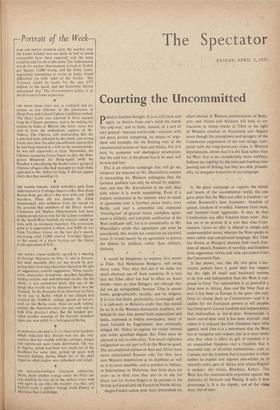Courting the Uncommitted
PHRASES fossilise thought. It is as well, now and again, to dismiss from one's mind the words 'the cold war,' and to think, instead, of a sort of very general—because world-wide—election, with two great parties competing, by means of argu- ment and example, for the floating vote of the uncommitted nations of Asia and Africa. For it is here, by economic and ideological penetration, that the cold war, if the phrase has to be used, will be won and lost.
This is an election campaign that will go on, whatever the measure of Mr. Macmillan's success in persuading his Western colleagues that the German problem can only be solved by negotia- tion, and that Mr. Khrushchev is the only man with whom it is worth negotiating. Even if a summit conference in the summer were to result in agreement over a German peace treaty, over Berlin, and over a controlled and inspected 'thinning-out' of ground forces (complete agree- ment is unlikely, and complete satisfaction in the West unlikelier still, but it is considerably to Mr. Macmillan's credit that agreement can even be considered), this would not constitute an electoral truce. It would merely be an agreement to pursue the debate by political, rather than military, dialectic.
It would be dangerous to suppose that events in Tibet, that, Himalayan' Hungary, will swing many votes. They may,- but not if we make too much electoral use of them ourselves. It is true that the Tibet affair has had its effect on Asian minds—more so than Hungary did (though that did not go unregarded), because Tibet is nearer home, geographically, racially, and by religion. It is true that India, particularly, is outraged, and it is indirectly to Britain's credit that this should be so. It is the Western democratic tradition, left behind by men who served both imperialism and India, expressed in Indian newspapers, many of them founded by Englishmen, that evehtually obliged Mr. Nehru to register his rather belated and rather qualified disgust. But Tibet must be allowed. to tell its own story. Too much righteous indignation on our part will do the West' no good. The uncommitted nations of Asia and Africa have never experienced Russian rule, but they have seen Western imperialism at its shabbiest as well as at its most unselfish, and to pretend to Indians, or Indonesians, or Malayans, that those days are over—as in their case they are—is to ask for black and for brown fingers to be pointed at the British in Central and the French in North Africa.
Anglo-French action over Suez diminished the ell eel abroad of Western denunciations of Buda- pest, and Asians and Africans will look at our reactions to recent events in Tibet in the light of Western conduct in Nyasaland and Algeria (even though the promptness and savagery of the Communist suppression of the two risings, com- pared with the long-drawn-out crises in Western dependencies, shows that it is the East rather than the West that is the considerably more ruthless). Indians are repelled by the cant and humbug now pouring out of Peking, but they are able, presum- ably, to recognise hypocrisy in any language.
In the great campaign to capture the minds and hearts of the uncommitted world, the one great prize that the West can offer is freedom—or rather Roosevelt's four freedoms: freedom of speech, freedom of worship, freedom from want, and freedom from aggression. It may be that Communism can offer freedom from want : that has yet to be proved. It is true that what Com- munism claims to offer is offered in simple and understandable terms, whereas the West speaks in more subtle and complicated language. But Tibet has shown, as Hungary showed, how much free- dom of speech, freedom.of worship, and freedom from aggression Africa and Asia can expect from the Communist East.
It has shown, too, that the two great Com- munist powers have a good deal less respect for the right of small and backward nations to be free and independent than the West is sup- posed to have. Yet nationalism is as powerful a force now in Africa, Asia and the Near East as ever it has been in Europe in the past—the only force as strong there as Communism—and it is useless for the European powers to tell peoples that have never known freedom and independence that nationalism is out-of-date. Nationalism is never out-of-date until it has been enjoyed—and unless it is enjoyed the four freedoms have little appeal; until then it is a movement that the West has to recognise and respect, just as it must make sure that when it offers its gift of freedom it is an unqualified freedom—not a freedom that is accorded only to all-white communities, such as ' Canada, nor the freedom that is accorded to white settlers to exploit and oppress non-whites, as in virtually every part of Africa now where English is spoken : the Union, Rhodesia, Kenya. The West has the unanswerable argument against the dialectics of Moscow and Peking, if only it dare pronounce it. It is the dignity, not of the white man, but of man.


































 Previous page
Previous page